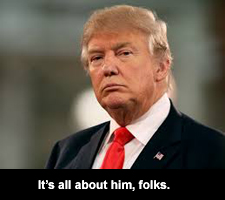I probably spend way too much time thinking about elections. I suspect you think so too, particularly since I’ve devoted so many blog posts to the subject. I even talked about it a lot on my short-lived political podcast, Strange Sound, though not so anyone would hear. The fact is, I kind of hate elections. They’re nerve-wracking as hell, they often turn out badly, and I’m not a big fan of suspense, especially when it runs all night long. But that’s just experience talking – long, bitter experience.
There are many things we can do that are more important than voting. Mutual aid, organizing, public service … all of these things make an immediate difference for people. But more than one thing can be important at the same time, and my contention has always been that voting is important enough to do, even if it isn’t as important as all that other stuff. For people like me – CIS-gender white males – the time commitment involved is negligible.
So, though I’m not a huge NPR fan, I was excited when I heard that a recent Serial Podcast had centered on elections in North Carolina and purported voter fraud. But after listening to it, I can only say that they kind of hid the ball. Or dropped it. Not sure which.
Organizing is the enemy
Without getting too deep in the weeds of the podcast, The Improvement Association – a co-production of NPR’s This American Life / Serial and the New York Times – talks about a political action committee in Bladen County, North Carolina that does get-out-the-vote efforts for black residents. They basically hand out a sample ballot with their recommendations and encourage people to support their list. In short, this is organizing 101, completely legal and above board, and a really effective way to drive turnout and support for Democratic candidates.
Naturally, the Association is under constant attack by white politicians, who accuse the organizers of voter fraud. They basically gaslight the organization, so that when an actual Republican voter fraud scheme is busted, somehow this black organization’s name is dragged into the conversation both on a local and a statewide level. The white people in this story – mostly Republicans – understand the power of this black voting block, and they’re using the tools available to them (i.e. baseless accusations of cheating) to undermine it. What is more of a threat to white power than organized black people?
Strange focus
What kind of astonishes me about this podcast is the degree to which the reporter, Zoe Chase, gets sidetracked by this internal power struggle within the PAC. Now, it should come as a surprise to no one that organizers and political agitators tend to have egos. It seems likely that the two lead organizers, Horace and Cogdell, push to get their own way in the context of the organization. But if the ultimate goal is more power and resources for black people in the sea of white people known as North Carolina, is this all that bad?
Chase follows Cogdell’s efforts to elect three black councilmembers in a little town named Elizabethtown – a majority black community run by rich, white people, where there is virtually no public investment in the black neighborhoods. Chase spends a lot of time on the critics’ accusation that Cogdell is doing this so that he will be able to control these three black women on the town council. In the end, Cogdell’s candidates lose, and his colleague Horace suggests that this was essentially because black people were voting against their own interests for one reason or another. This is Chase’s take on Horace:
“It’s always zero sum with Horace when it comes to politics. I’ve learned that. If you’re not with him, you’re against him. And if you’re against him, you’re wrong.“
The thing that must not be named
On the other hand, what I hear from Cogdell is a pretty reasonable economic, almost Marxist analysis of how power works in that little town. A minority of white people with money get all the benefits, while underrepresented black people get the shaft. NPR / NYT say little if anything about this dynamic. It’s really more about personal squabbles. That’s what makes a podcast go viral, right?
Am I surprised to learn that NPR / NYT reporters are constitutionally incapable of giving credence to this kind of analysis? Not at all. There was a similar issue with the podcast Nice White Parents which I talked about on my podcast, Strange Sound. They will twist themselves into knots trying to avoid it.
luv u,
jp


 Super Storm. Hurricane Florence is bearing down on the east coast of the U.S., and is his wont, the President’s first comments centered on, well, himself and the amazing job he did when Hurricane Maria battered Puerto Rico last year. He is flatly denying the veracity of the revised casualty figures that put the death toll from Maria above that of Katrina, saying that the higher numbers were made up by Democrats to make him look bad. I’m betting George W. Bush looks at this with envy and wonders why he never thought of just totally and persistently making shit up about New Orleans.
Super Storm. Hurricane Florence is bearing down on the east coast of the U.S., and is his wont, the President’s first comments centered on, well, himself and the amazing job he did when Hurricane Maria battered Puerto Rico last year. He is flatly denying the veracity of the revised casualty figures that put the death toll from Maria above that of Katrina, saying that the higher numbers were made up by Democrats to make him look bad. I’m betting George W. Bush looks at this with envy and wonders why he never thought of just totally and persistently making shit up about New Orleans. Today, the Baghdad government is ripping Fallujah yet another new asshole. It’s worth recalling that the ISIS militants they are fighting in that unfortunate city are mostly disaffected Sunnis, the most senior of which were probably part of Saddam’s army, the younger ones simply kids with no future, like so many Gazans or West Bank Palestinians. Malcolm Nance reminds us that, prior to our 2003 invasion, there were no Al Qaida to speak of in Iraq; after the invasion, they numbered in the low thousands. It wasn’t until the utter failure of the post-invasion regime to incorporate Sunnis into society (and, yes, the arrest and disappearance of many at the hands of the Iraqi security forces) that these young people became fodder for opportunistic Salafi organizations like ISIS.
Today, the Baghdad government is ripping Fallujah yet another new asshole. It’s worth recalling that the ISIS militants they are fighting in that unfortunate city are mostly disaffected Sunnis, the most senior of which were probably part of Saddam’s army, the younger ones simply kids with no future, like so many Gazans or West Bank Palestinians. Malcolm Nance reminds us that, prior to our 2003 invasion, there were no Al Qaida to speak of in Iraq; after the invasion, they numbered in the low thousands. It wasn’t until the utter failure of the post-invasion regime to incorporate Sunnis into society (and, yes, the arrest and disappearance of many at the hands of the Iraqi security forces) that these young people became fodder for opportunistic Salafi organizations like ISIS.